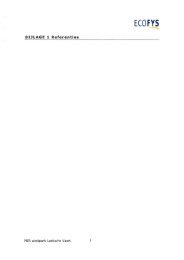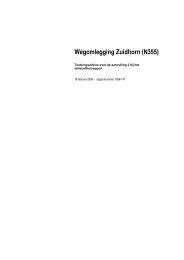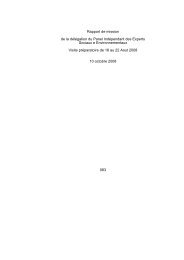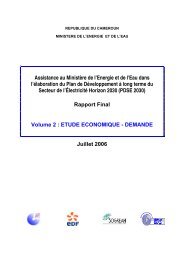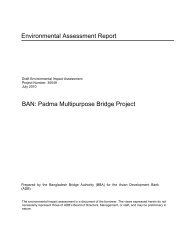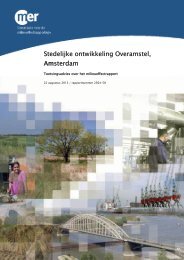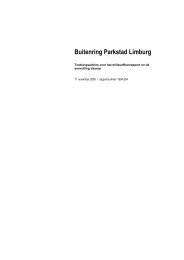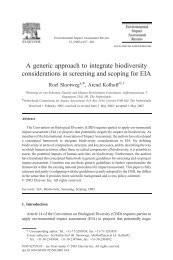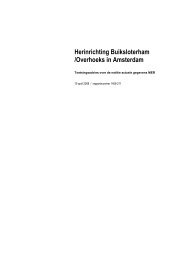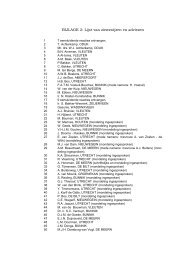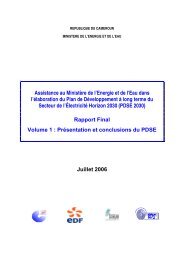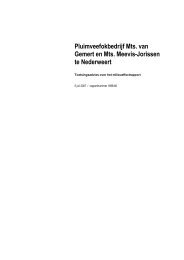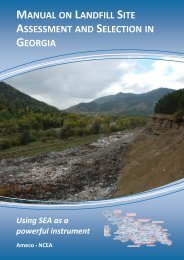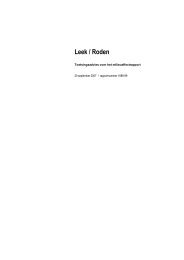2. <strong>Scoping</strong> part 1 – <strong>the</strong> setting of <strong>IWRM</strong> in <strong>Rwanda</strong>2.1 State of affairs: <strong>IWRM</strong> in <strong>Rwanda</strong><strong>Rwanda</strong> is a small, land-locked, mountainous country in Central Africa upstream of <strong>the</strong> Congo andNile river basins. The climate is tropical with relatively low temperatures due to high altitudes.<strong>Rwanda</strong> has two rainy seasons, one from March till May and one less intense rainy season fromSeptember till December. A key issue in <strong>Rwanda</strong>’s development is <strong>the</strong> high population density.While water availability currently seems less of an issue than actual access to water, waterdistribution and sharing issues may become critical in years to come with increasing economicdevelopment and population growth. For this reason, <strong>the</strong> Government of <strong>Rwanda</strong> adoptedIntegrated Water Resources Management (<strong>IWRM</strong>). With <strong>IWRM</strong>, <strong>the</strong> GoR intends to achieve <strong>the</strong>following policy objectives 9 :1. Reduce water related disaster risks and climate impacts like droughts and floods toprotect <strong>the</strong> economy and society.2. Protect and conserve water resources of <strong>Rwanda</strong> in order to enhance its availability <strong>for</strong> <strong>the</strong>present and future generations3. Allocate water resources of <strong>Rwanda</strong> to <strong>the</strong> various socio-economic needs on <strong>the</strong> basis ofprinciples that incorporate efficiency of use, equity of access, and sustainability.4. Put in place an effective governance framework and develop human and technicalcapacities <strong>for</strong> sustainable management of <strong>the</strong> country’s water resources, includingtransboundary waters.Based on document study, <strong>the</strong> Kigali Workshop and additional interviews, <strong>the</strong> NCEA observesa step-by-step manner in which legislation and related policy documents are being developed,which is logical and consistent with international principles <strong>for</strong> <strong>IWRM</strong>. A number of relevantdocuments is available (<strong>for</strong> fur<strong>the</strong>r references, see Appendix 7):- The Economic Development Poverty Reduction Strategy 2008-2012 (EDPRS 2) states that ‘Ahigh priority of <strong>the</strong> EDPRS is to ensure sustainable and integrated water resourcesmanagement and development <strong>for</strong> multi-purpose use...’- The Water Law covers main principles of <strong>IWRM</strong>, defines all main water usage, sets out <strong>the</strong>institutional framework on how to implement <strong>IWRM</strong>.- The National Policy <strong>for</strong> Water Resources Management fur<strong>the</strong>r elaborates <strong>the</strong> water law and isconsequently based on principles of <strong>IWRM</strong>. It is a well-developed document providing <strong>the</strong>9 Strategic Plan <strong>for</strong> Water Resources Management 2013/14-2017/18, Chapter 3: Mission and Objectives, p.14, RWRD,RNRA, MINIRENA, August 20126
main water-related actors, an overview of dominant water related issues and an overview ofimplementation steps.- A WRM Strategy and a WRM Five-year Plan describing <strong>the</strong> funding needs <strong>for</strong> <strong>the</strong>implementation of <strong>the</strong> Strategy, were being finalised during NCEA’s mission. The GoR hassecured funding from its own means <strong>for</strong> approximately 50% of <strong>the</strong> necessary budget <strong>for</strong> a 5year period, showing its commitment to implement <strong>IWRM</strong> in <strong>Rwanda</strong>. Staffing of <strong>the</strong> WaterDepartment is gradually being increased.1. The NCEA concludes that <strong>Rwanda</strong> has made swift and consistent steps in <strong>the</strong> development of an<strong>IWRM</strong> policy framework at national level, following internationally acknowledged principles of<strong>IWRM</strong>, showing commitment to <strong>the</strong> process by allocating significant staff and budgetary means to<strong>the</strong> process.Aside from this progress in <strong>the</strong> development of <strong>the</strong> policy and institutional framework <strong>for</strong> <strong>IWRM</strong>,<strong>Rwanda</strong> has started making <strong>IWRM</strong> operational:- The strategy is at present being translated into a comprehensive National Water ResourcesMaster Plan, to be finalised be<strong>for</strong>e October 2013. The Master Plan process fully integrates andoperationalises <strong>the</strong> principles of <strong>IWRM</strong> 10 . The Master Plan is developed by an international andlocal team of consultants (SHER) 11 . See also 2.3.- The same consultant is developing a Management In<strong>for</strong>mation System (MIS) <strong>for</strong> waterresources management.- The <strong>Rwanda</strong> Integrated Water Security Program (RIWSP), supported by USAID, has recentlydeveloped a capacity needs assessment 12 , as well as a staffing plan 13 <strong>for</strong> <strong>the</strong> waterdepartment. These two documents provide great detail and illustrate which relevantknowledge and know-how is present in each governmental organisation involved in waterrelated issues. The staffing plan shows how <strong>the</strong> RWRD will develop. At present <strong>the</strong> departmenthas about 18 employees and 3 directors will be selected soon.- Several programmes and projects have initiated activities in local catchments, which contain(elements of) <strong>IWRM</strong> principles. These programmes however do not fully cover <strong>the</strong> country, donot always seem to be coordinated from an <strong>IWRM</strong> perspective, or have only just recentlystarted. These include national projects, such as <strong>the</strong> Land and Water Husbandry (LWH) project,supported by <strong>the</strong> World Bank, RIWSP, and regional programmes, such as, among o<strong>the</strong>rs, <strong>the</strong>Kagera River Transboundary Integrated Resources Management and Development (KR-TIRWM&D) and <strong>the</strong> Lake Victoria Environmental Management Project Phase (II) (LVEMP-II).10 Consultancy services <strong>for</strong> development of <strong>Rwanda</strong> national water resources master plan (Progress report -1), SHER Ingénieurs-Conseils s.a., October 201211 Terms of Reference <strong>for</strong> <strong>the</strong> development of <strong>the</strong> National Water Resources Master Plan (NWRMP), RWRD, 201112 Capacity Situation Analysis and Capacity Development Needs Assessment of Integrated Water Resources Management Sub-Sector in <strong>Rwanda</strong> (draft final report), RIWSP/Centre <strong>for</strong> Resources Analysis Limited, April 201213 Organisational Review and Five-Year Staffing Plan <strong>for</strong> <strong>the</strong> Integrated Water Resources Management Department of <strong>the</strong> <strong>Rwanda</strong>Natural Resources Authority, RIWSP/Centre <strong>for</strong> Resources Analysis Limited, October 20127



